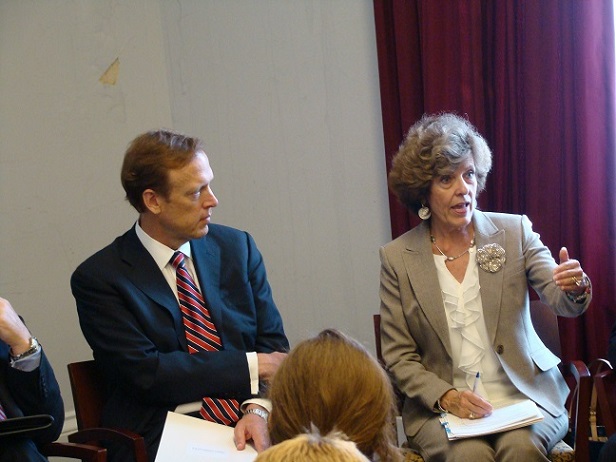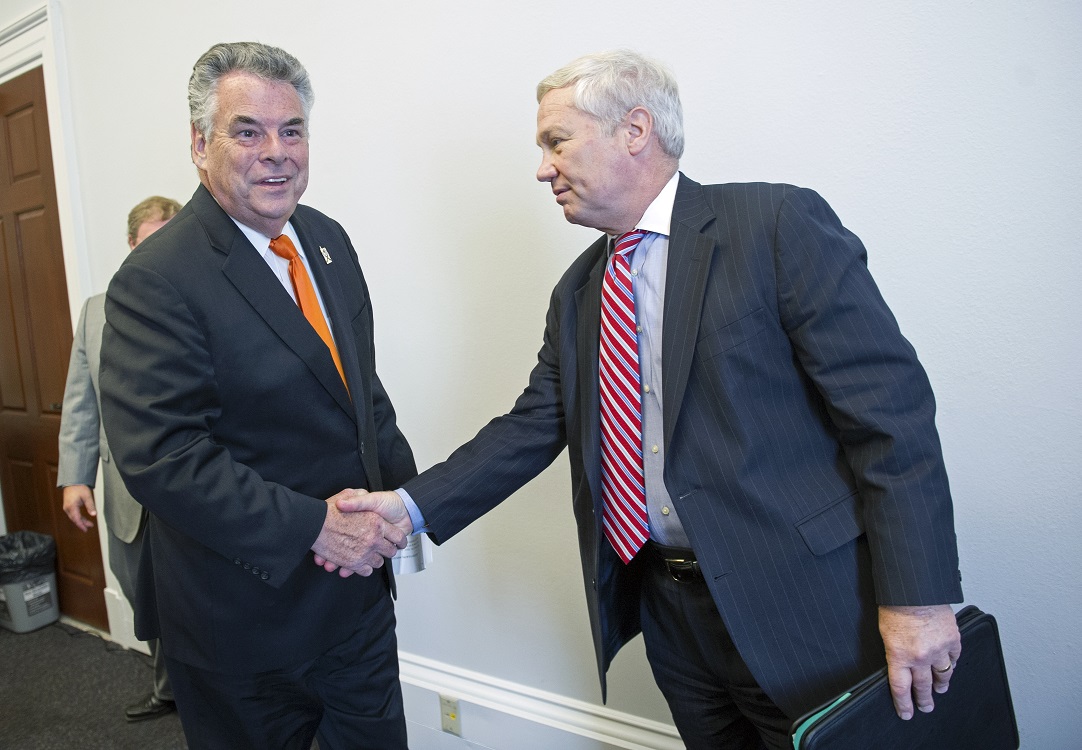WASHINGTON — Credit unions and banks work together in theircommunities, and if they could elevate that spirit of collaborationto the federal level, it could result in capital reforms for bothtypes of financial institutions, said Linda Armyn, senior vicepresident of corporate strategy for the $5.3 billion BethpageFCU.
|Armyn made the remark while moderating a legislative briefingThursday on Capitol Hill in support of H.R. 719, the Expanding Consumer Access to Affordable FinancialServices Act, which would give credit unions access to supplementalcapital. The bill currently has 38 co-sponsors: 28 are Democrats,and 10 are Republicans.
|While trade association representatives on the briefing panelsaid they hope to work together with bank trade associations toadvance the bill, the other side of the aisle has traditionallyrefused to work together with credit unions in Congress.
|But Armyn told of how a big bank competitor in her Long Island,N.Y., market referred customers to Bethpage during tax season,because the 216,740-member cooperative offered free income taxfiling assistance to the community. Local community banks alsoreferred customers to Bethpage, she said.
|“If that isn't collaboration, I don't know what is,” shesaid.
| Panelist Mary Martha Fortney,president/CEO of NASCUS, said during her tenure leading the tradeassociation for state regulators, “the dialogue hasn't changed”between credit unions and banks. But, she said, there comes a timewhen the two must work together for the benefit of consumers.
Panelist Mary Martha Fortney,president/CEO of NASCUS, said during her tenure leading the tradeassociation for state regulators, “the dialogue hasn't changed”between credit unions and banks. But, she said, there comes a timewhen the two must work together for the benefit of consumers.
NAFCU President/CEO Fred Becker, also on the panel, said as theeconomy continues to struggle, bank executives need to realize thefocus should be on Main Street, not Wall Street.
|(At left, NASCUS President/CEO Mary Martha Fortneydiscusses why her trade association supports the bill, as CUNAPresident/CEO Bill Cheney looks on.)
|“We could be more helpful if we worked together,” Becker said.“So why not give credit unions something in exchange for somethingbanks want?”
|CUNA President/CEO Bill Cheney recalled the failure late lastyear of bankers to renew the Transaction Account Guarantee. Bankswould rather see their legislation burn than work together withcredit unions, he said, and that's exactly what happened. TAGis dead, but supplemental capital has survived to be considered ina new Congress.
|“Community banks and credit unions have so much in common, andso little that distinguishes them,” Cheney said. “At some point,they'll come to the realization that we have to work together.”
|Rep. Peter King (R-N.Y.), who along with Rep. Brad Sherman(D-Calif.) is a primary sponsor of the bill, spoke at the event inthe Cannon House Office Building and said he will ask HouseFinancial Services Committee majority leaders to include thelegislation in a housing financial reform bill that also contains anumber of regulatory relief measures.
|That bill, which has not yet been introduced, already wouldinclude Basel III capital relief for banks but no capital reformparity for credit unions.
|If made law, supplemental capital could help 40% of all creditunions immediately, Cheney said. While credit unions can alreadyraise additional capital through retained earnings, a method thatis less expensive, Cheney said it's also a less flexible strategy.And during tough economic times, it's difficult to do, he said.Supplemental capital would provide credit unions with a cushionthat could help ease that stress, he added.
|Becker said because credit unions are conservative by nature andslow to adopt new things, he doubts there would be a “tidal wave”of credit unions that would take in supplemental capital.
|Rather, he said, adoption of the authority would build overtime.
|Supplemental capital would take a different form than bankcapital, Armyn said. Two possible forms would be a high interest,uninsured certificate, and credit unions could control the incomingflow of funds with rates, much as they currently do with deposits,she said. Another alternative would be a $50 to $100 share thatwould remain in the institution until the member or non-memberwithdrawals it.
|The bill would allow regulators to determine if non-memberscould contribute capital. In May, NCUA Chairman Debbie Matz wenton record in a letter to King saying the regulator supportedthe bill, but did not say if the NCUA would allow non-members tocontribute capital if the bill became law.
|Cheney said approximately 2,000 credit unions already acceptnon-member deposits by virtue of their status as low-income creditunions. Fortney added that some states also allow non-memberdeposits, so the concept isn't a new one.
|William Mellin, president/CEO of the Credit Union Association ofNew York, was also a panelist.
|Below, Rep. Peter King (R-N.Y.) greets NAFCUPresident/CEO Fred Becker (right) prior to Thursday's legislativebriefing on H.R. 719. King is a primary sponsor of the bill, whichwould allow credit unions to accept supplement capitaldeposits.
|
Complete your profile to continue reading and get FREE access to CUTimes.com, part of your ALM digital membership.
Your access to unlimited CUTimes.com content isn’t changing.
Once you are an ALM digital member, you’ll receive:
- Critical CUTimes.com information including comprehensive product and service provider listings via the Marketplace Directory, CU Careers, resources from industry leaders, webcasts, and breaking news, analysis and more with our informative Newsletters.
- Exclusive discounts on ALM and CU Times events.
- Access to other award-winning ALM websites including Law.com and GlobeSt.com.
Already have an account? Sign In
© 2024 ALM Global, LLC, All Rights Reserved. Request academic re-use from www.copyright.com. All other uses, submit a request to [email protected]. For more information visit Asset & Logo Licensing.









